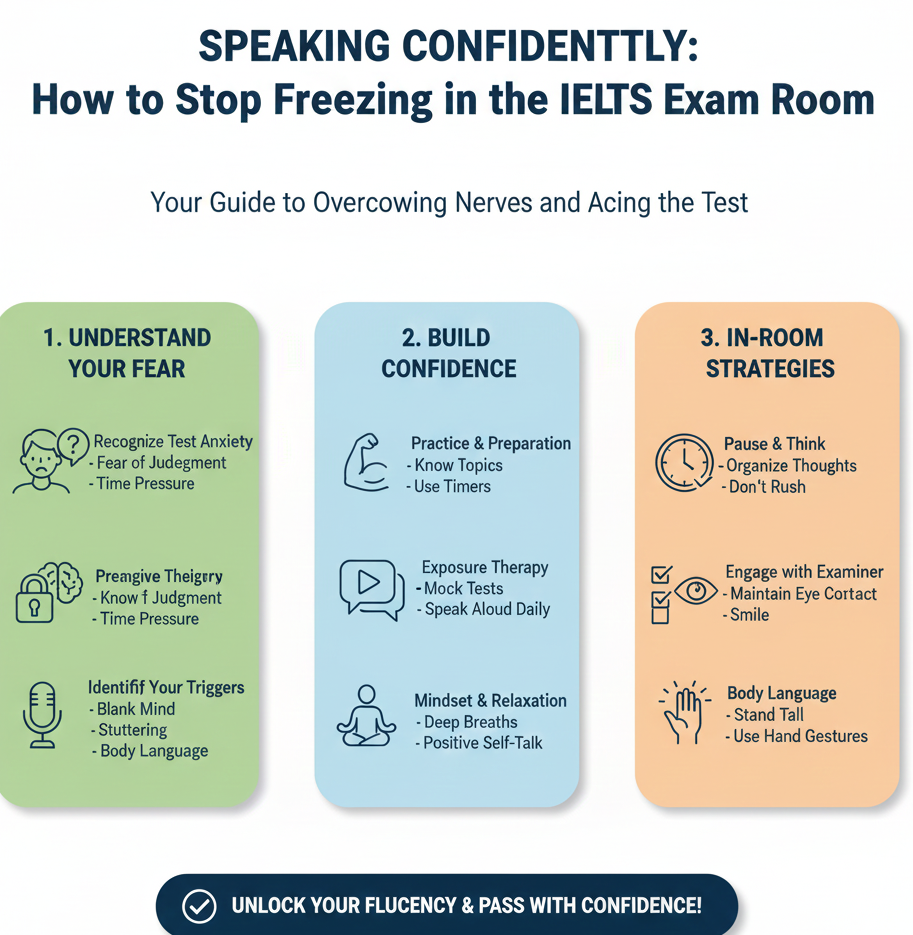
Your heart pounds. Your palms sweat. The examiner asks a seemingly simple question, and your mind, once full of vocabulary and ideas, becomes a silent, empty void. If the thought of the IELTS Speaking test triggers this reaction, please know this: you are not alone. Freezing under pressure is one of the most common—and most frustrating—experiences test-takers face.
The good news? Anxiety is normal, and more importantly, it can be managed. Confidence in the speaking test isn’t about being a flawless native speaker; it’s about preparation, strategy, and turning your nervous energy into a performance that showcases your true ability. Let’s break down how you can stop freezing and start speaking with confidence.
1. Practice Under Real Pressure: The Timer is Your Friend
The Problem: Practicing answers casually in your head is not the same as speaking aloud for 2 minutes straight under exam conditions. Without timed practice, the clock in the actual test becomes your enemy.
The Solution: Recreate the exam environment.
For Part 2 (the long turn), use a timer for one minute of preparation and two minutes of speaking—every single time. Use a phone to record yourself. This does two things: it desensitizes you to the pressure of being recorded and timed, and it gives you concrete evidence of your performance. You’ll be amazed at how much more manageable the real test feels after numerous timed rehearsals.
2. Master the Art of the Filler
The Problem: Many students believe that silence is a sign of failure. This fear of a pause leads to panic, which leads to freezing. In reality, native speakers pause to think all the time—they just do it strategically.
The Solution: Use “thinking phrases” to buy time gracefully.
Silence is awkward. A thoughtful phrase is fluent. Instead of panicking, use these moments to show off your language control. Memorize a few and use them naturally when you need a second to formulate your next idea:
- “That’s an interesting question…”
- “I’ve never really thought about that before, but…”
- “Well, let me see…”
- “There are a couple of ways to look at this. Firstly…”
These phrases are not a sign of weakness; they are a sign of a competent speaker managing a conversation.
3. Become Your Own Coach: The Power of Recording
The Problem: You don’t know what you sound like. You might be unaware of a habit of saying “um” too often, speaking too quickly, or trailing off at the end of sentences.
The Solution: Record your practice answers and listen back critically.
This can be cringeworthy at first, but it is the single most effective way to improve. When you listen to yourself, ask:
- Fluency & Cohesion: Did I use linking words? Were my pauses too long?
- Vocabulary: Did I repeat the same simple words? Could I have used a synonym?
- Grammar: Did I make consistent tense errors?
- Pronunciation: Was I clear and easy to understand?
This objective feedback is invaluable and allows you to target your specific weaknesses.
4. Build a “Go-To” Vocabulary Bank
The Problem: Freezing often happens because you’re trying to invent complex ideas and advanced vocabulary on the spot. Your brain gets overloaded and shuts down.
The Solution: Prepare vocabulary for common topics in advance.
You know the IELTS Speaking test revolves around common themes: family, work, education, hobbies, environment, technology, etc. Don’t wait for the exam to think of good words.
For each common topic, develop a small bank of 5-7 strong, topic-specific words or phrases you feel comfortable using.
- Topic: Environment: sustainable, carbon footprint, environmentally conscious, renewable energy, protect wildlife.
- Topic: Technology: user-friendly, digital age, automate tasks, a double-edged sword, stay connected.
Having this pre-prepared vocabulary at your disposal reduces the mental load during the test. You can focus on answering the question instead of scrambling for words.
Your Confidence is Built in Practice, Not in Panic
Beating exam freeze isn’t about magically eliminating nerves. It’s about having so much practice and so many strategies to fall back on that your confidence overpowers your anxiety.
At GoatGuru English, we specialize in building that confidence. Our IELTS Speaking Practice Guides are designed to target these exact pain points. They include:
- Timed Practice Cards for all three parts of the test.
- Vocabulary Builders for every common topic.
- Sample Answers that show how to integrate strategies fluently.
Don’t let anxiety rob you of the score you’ve worked for. Preparation is the antidote to panic.
